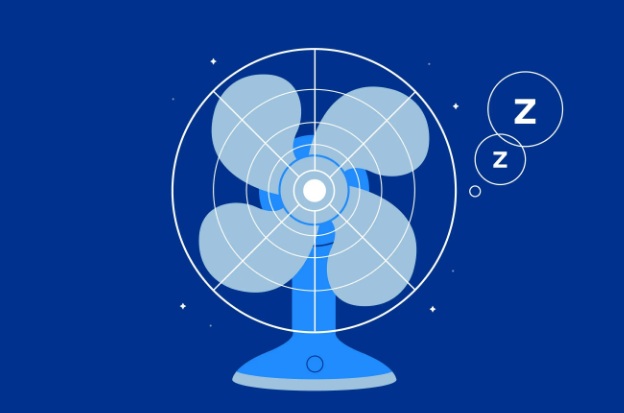it’s about time your fan gets into action. The soothing air from your fan dries sweat and cools you down, but is sleeping with a fan on bad for health?
The constant breeze may impact the health of some people, while for others sleeping with the fan on enhances comfort. In this article, we discuss how sleeping with a fan can affect your health, ways to tackle the downsides of keeping the fan on, and why using a fan is still beneficial for many people.
Most people enjoy the cooling and comfortable breeze of a fan. But excess wind makes the air dry. When you sleep, this dry air may affect your breathing, causing sleep disruptions. It can even aggravate your allergies, making you uncomfortable throughout the night. Below, we list 4 disadvantages of sleeping with the fan on.
Triggers Allergies
Along with air, fans also circulate dust, dust mites, spores, pollen, and other allergens in the room. Inhaling these allergens could trigger reactions such as excessive sneezing, runny nose, watery eyes, itchy throat, and breathing difficulties. If you are prone to asthma, allergies, and hay fever, these indoor allergens may worsen your symptoms.
Causes Congestion
Leaving the fan on can dry out your nose and throat. Excessive dryness triggers the overproduction of mucus, causing sinusitis, headaches, and a stuffy nose.
To alleviate the dryness, you can drink some water, but waking up to drink over and over interrupts sleep.
Dries Eyes and Skin
If you sleep with your eyes open, the air from the fan can dry your eyes out.
A constant blast of air may also cause dry skin and irritation. Using moisturizers at bedtime may tackle the problem to some extent.
May Aggravate Muscle Aches
Cold air circulating close to you can cause muscle contractions. If you already have pre-existing muscle pain, it may worsen when you sleep with the fan on. The concentrated flow of cool air makes muscles tense up and cramp.
Sleeping with the air conditioner on at night can cause the same problem. To prevent waking up sore, it’s best to set your room temperature between 60 and 67 degrees Fahrenheit.
Minimizing the Negative Effects of Sleeping With the Fan On
Though sleeping with the fan on may be bad for your health, there are ways to minimize its negative effects. The fan’s speed and distance from you determine its degree of impact on your health. Keeping the fan further away from you or setting a timer can prevent nasal congestion, headaches, muscle aches, and eye dryness.
Use Air Filters
Air filters in the room can reduce the circulation of dust-mites, spores, and other allergens. Using one may be beneficial for those prone to allergies.
Buy a Rotating Fan
A rotating fan prevents the constant flow of air in one direction. Evenly distributed airflow keeps you cool while potentially preventing stiff neck, muscle aches, dry nose, mouth, and eyes.
Set a Timer
You can set a timer on the fan so it turns off an hour or a couple of hours after your bedtime. It eliminates the risk of a cold breeze blowing throughout the night, which can leave you feeling uncomfortable.
Keep Fan at a Distance
If you keep the fan 2 to 3 feet away, the concentrated airflow won’t affect you as much. You’ll have a light breezy sleeping environment instead of a gust of air blowing directly on you. If you sleep with the ceiling fan on, keep the fan on a moderate speed to prevent excessive dryness.
Benefits of Sleeping With a Fan On
It’s difficult to imagine a hot and humid summer without a fan. You need a fan to keep you cool when the temperatures soar. To reap the benefits of the cool air while minimizing the downsides, keep your fan at a distance and on medium speed.
Maintains Comfort
Hot sleepers tend to wake up sweating. Disturbed sleep leads to daytime drowsiness, affecting productivity. Sleeping with the fan on prevents overheating. Even if you sweat at night, the breeze dries away excess moisture, keeping you cool and comfortable while you sleep.
Promotes Air Circulation
People often prefer to keep their windows closed because they don’t want to invite pollen and other allergens from outside.







.webp)

















